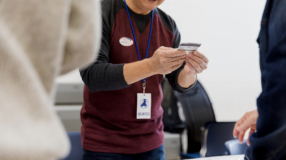States across the country are adopting a policy called universal licensing recognition. What is this policy and how does it help everyday Americans? Let’s take a look—but first, a quick refresher on occupational licensing may be helpful.
What is occupational licensing?
An occupational license is a permission slip from the government that allows someone to work in a certain field. Also called a job license, the process for obtaining this permission slip often includes training requirements and various fees to licensing agencies.
Most licensing requirements exist at the state level, and every state is different. Not every worker needs an occupational license to do their job, but an astounding one in four workers do. Beauticians, nurses, cosmetologists, and auctioneers are just some of the many professionals that are likely to need a license to work.
Why does occupational licensing exist?
At its core, the idea is to ensure safety and a common standard for entering a profession.
Take nursing, for example. Nurses have to get a license from the state to prove they are qualified to treat patients. Americans want peace of mind that the nurse treating them is able to do her job—and that’s where occupational licensing comes in.
But licensing also extends to many other jobs that are less obvious, such as florists, manicurists, and barbers. It’s typically in these less-obvious jobs that licensing requirements can become onerous and often irrelevant to the job. One of the most startling examples was in Tennessee where—prior to a Beacon Center legal victory—it could take up to 300 hours to earn a license to wash people’s hair.
Now imagine having to recommit those 300 hours when you move—just to be able to earn a living. This burden exists for many workers in the United States because most states do not accept job licenses from other states. Every time a worker with a license moves, they often have to restart the licensing process to get their permission slip to work.
What is universal licensing recognition?
Some states do recognize job licenses from other states. When a state accepts licenses from other states, this is called universal recognition.
States with universal recognition don’t automatically recognize another state’s license. Instead, they apply common-sense standards to judge if another state license should be treated as valid. For instance, Ohio recognizes food truck licenses from other states if the person had been licensed for more than a year in their previous state.
Arizona was the first state to enact universal recognition of occupational licenses in 2019, based on recommendations from the Goldwater Institute. Since then, numerous other states have enacted their own recognition laws, and many other think tanks in the Network have joined with Goldwater to call for reforms in their own state’s licensing laws—including adopting universal licensing recognition.
What are the benefits of universal licensing recognition?
Several groups—ranging from the White House, to the Brookings Institution, to Arizona State University—have highlighted the benefits of universal recognition.
These benefits include:
- Boosting employment
- Lowering prices
- Increasing the quality of licensing requirements
Universal licensing recognition creates jobs and boosts employment.
Between 25 and 30 percent of all jobs require an occupational license. And because most states don’t recognize the job licenses of other states, this means a quarter of the entire United States’ workforce must re-complete licensing requirements when they move to another state. Imagine having to complete hundreds of hours of training, and pay more fees, to prove that you can do a job that you were already doing somewhere else. This is especially onerous for those who move frequently, such as military spouses.
Even before the pandemic, most Americans lived paycheck-to-paycheck. Few Americans can afford to take hundreds of hours of unpaid training to get recertified for a job when they move to another state. So, these people are unlikely to move to pursue a new opportunity.
Universal licensing recognition lowers prices and increases the supply of goods and services.
When Americans can’t move and immediately find work in their field, they tend to stay put. When people can find work, they are more willing to move to a new state. Because of this, universal licensing recognition can increase the supply of goods and lower prices. This happens for two reasons.
First, when the government requires a worker’s time and money to enter a profession, the simple cost of doing business is increased. Every business has some costs to get started. For example, every business has to buy inventory, such as the meat and buns a new restaurant has to buy to sell burgers. Licenses almost always cost money, so requiring a license increases the cost of doing business. Requiring a new license every time someone moves increases their costs even more. When states recognize licenses from other states, it lowers the cost of doing business, which can lower prices.
The second reason universal recognition lowers prices is because it breaks up monopolies. Licensing boards are often filled with current professionals in that field. Like with other cases of industry-insider licensing monopolies, this allows the existing professionals to keep out competitors. If a group of carpenters gets to decide if a new carpenter can open a business, they’re most likely going to say “no” every time. Denying someone a job license means they keep a competitor out of the market and keep more of the business for themselves.
Every extra step someone has to take to join a profession usually serves to keep fewer people from joining that profession, decreasing the competition that is historically shown to lower prices and increase the quality of a product or service.
Universal licensing recognition makes existing licensing requirements better.
Perhaps the least obvious benefit of universal recognition is that licensing gets better. “Better” licenses are the ones that ensure quality and competency in a profession.
As explained above, most licensing boards are made up of members of that industry. These boards are often more concerned with keeping competitors out than they are with creating licensing requirements that improve the quality of goods or services.
If people can earn their license in any state, it’s a lot harder for any specific state’s licensing board to keep competitors out. This results in licensing boards that focus on creating licensing requirements to ensure quality and safety—not on preserving a monopoly.
Does universal licensing recognition lower safety standards?
Though the concept of universal recognition has grown in popularity in recent years and boasts wide support across a number of states, there are some who oppose the practice. Many of those opposed to the concept claim that universal licensing recognition lowers safety standards, but this simply isn’t true.
Some states have lighter requirements than others to attain a license, so opponents worry that this will mean lower safety standards everywhere. But this ignores how most states adopt universal recognition. Even with universal licensing recognition, states can specify how a worker transfers their license. For instance, in Colorado, a worker only receives licensing reciprocity if they are in good standing with their original state’s licensing board. Similarly, in Arizona, someone can only transfer a license if they’ve been in good standing for more than a year with their state’s licensing board and passed some sort of certification that proves competency. The idea with these standards is to continue ensuring safety while removing barriers to employment for hardworking Americans.
As mentioned earlier, when states adopt universal licensing recognition, they often see improvements in their own licensing standards. Because existing members of an industry are no longer able to control who they compete with, licensing regulations focus more on quality and less on maintaining monopolies. The more states enact universal licensing recognition, the more states have licensing requirements focused on quality and safety.
How universal licensing recognition helped fight the pandemic
One of the first things states did to combat the coronavirus was reduce restrictions so doctors could practice across state lines. In fact, more than 45 states enacted some type of universal recognition for medical licenses.
Why did states make these changes? Because they knew that expanding supply and therefore access to healthcare was critical for the country. Not only did this lead to increased access to medical care, it provided a perfect case study in just how valuable universal recognition is. Because doctors weren’t required to get a new license to treat coronavirus patients in another state, countless Americans were able to access medical care when they needed it most.
Additional Resources
Research
You Can Take It with You: A Case for Occupational Licensing Reciprocity
Center for the Study of Economic Liberty, Arizona State University
Universal Recognition of Occupational Licenses Act – Model Legislation
Institute for Justice
Reforming Occupational Licensing Policies
The Hamilton Project, Brookings Institution
Occupational Licensing: A Framework for Policymakers
Obama White House
Media and Other Commentary
Universal Recognition: A State-Based Solution for Licensed Workers
American Legislative Exchange Council
Occupational Licensing Reforms to Celebrate from 2020
Independent Women’s Forum
Universal Licensure Recognition
National Conference of State Legislatures
State Commentary
Licensing Recognition for Telehealth Providers in Alaska
Alaska Policy Forum
Senate Advances Universal Recognition Bill
Empower Mississippi
Universal Licensing Recognition
Foundation for Government Accountability
Breaking Down Barriers to work with Universal Recognition
Goldwater Institute
Nine States Now Have Enacted Universal License Recognition. Why Not North Carolina?
John Locke Foundation
Eager to Welcome Workers, Legislatures Move Quickly on Universal Licensing Recognition
Platte Institute










